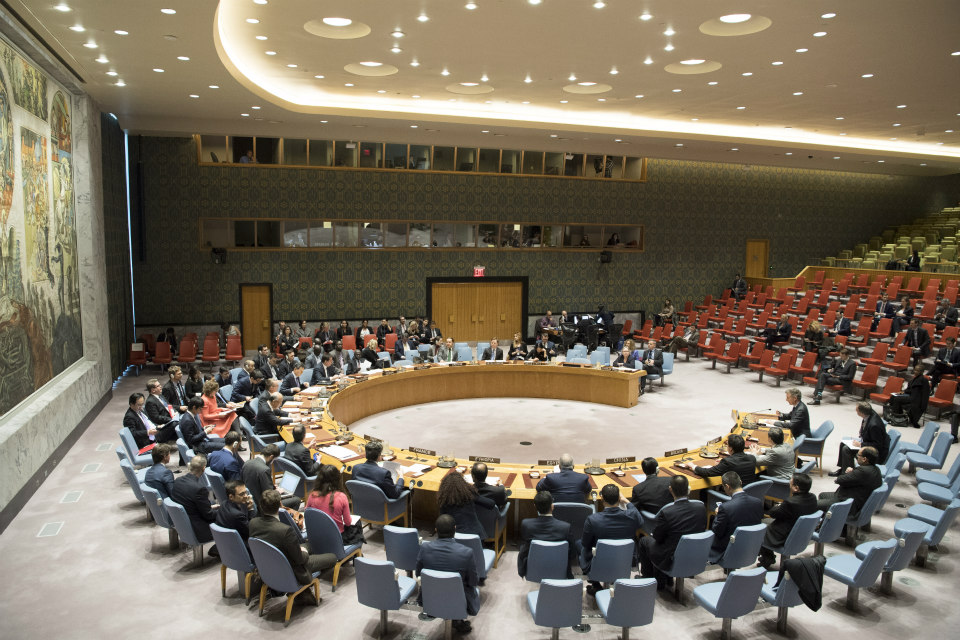"The Joint Comprehensive Plan of Action is one of the greatest diplomatic successes in recent memory"
Statement by Ambassador Matthew Rycroft, UK Permanent Representative to the UN, at the Security Council Briefing on Non-Proliferation.

Thank you Mr President.
And thank you to our briefers. Jeff, for your comprehensive presentation of the Secretary-General’s fourth report. Jo, for your update on the Joint Commission. And Sebastiano, for your summary as facilitator of the 2231 format and indeed for all of your excellent work in that capacity and that of your team.
The Joint Comprehensive Plan of Action is one of the greatest diplomatic successes in recent memory. The continued endorsement of the deal, through Resolution 2231, is another considerable achievement and also a responsibility for all of us. We remain committed to its full and equitable implementation by all parties.
As the Secretary-General’s latest report demonstrates, the nuclear components of the deal are working. Iran is complying with its nuclear commitments. For our part, we are committed to ensuring that the Iranian people see tangible benefits, including from sanctions relief. I encourage all Member States to uphold their commitments. We welcome the Secretary-General’s recommendation to further promote understanding of 2231 and of the Procurement Channel. We are committed to supporting these efforts.
However, despite this progress, four elements of the report are concerning. They relate to provisions of Annex B. They hinder the full realisation of the reciprocal benefits of the deal and they undermine faith in Iran’s long term commitment to regional stability.
Firstly, we are deeply concerned by reported transfers of Iranian ballistic missile parts and related technology to the Houthis in Yemen. Such transfers would be a violation of Resolution 2231 which prohibits the transfer to and from Iran of ballistic missile technology and related materiel. These transfers would also violate Resolution 2216 which prohibits the sale or transfer of arms and related materiel to the Houthis.
The Houthi missile attack on Riyadh on 4 November deliberately targeted a civilian area. And earlier today, we heard reports of a further missile attack on Riyadh, this time aimed at the Yamama Palace. Both would have caused suffering and chaos had they landed as intended. This is clearly unacceptable and risks escalating the situation.
The transfer of weapons to the Houthis threatens regional security and stability. Their use is prolonging the conflict in Yemen and contributing to heightened regional tensions.
It is essential that the UN conducts a thorough investigation and informs the Security Council of its conclusions as soon as possible. We strongly support the Secretary-General’s call for a joint meeting of the 2140 Committee and the 2231 format. This will allow for a coherent discussion of the use of ballistic missiles against the Kingdom of Saudi Arabia while also considering next steps to address this threat.
Secondly, we are concerned by the continued reported violations of restrictions on arms-related provisions. Evidence of these activities is mounting. The latest report indicates that the arms seized from a dhow near the Gulf of Oman and an unmanned surface vessel recovered in Yemeni waters are both of Iranian origin. These activities, which are contrary to our Security Council Resolution, give us further cause for concern over Iran’s involvement in that conflict.
Thirdly, we are concerned by evidence relating to Iranian ballistic missile-related activities. Paragraph Three of Annex B calls upon Iran not to undertake any activity related to ballistic missiles that are designed to be capable of delivering nuclear weapons, including launches using such technology. The launch of the Simorgh space launch vehicle on 27 July made use of such technology and as such was inconsistent with Resolution 2231.
Finally, we are concerned by reports of multiple travel ban violations, including new infringements by Major General Qasem Soleimani. This is particularly disturbing given the public nature of the violation.
Putting all these issues together, it is clear that these activities are having a detrimental impact on regional security and are undermining Iran’s integration with the international community.
We remain committed to the full implementation of 2231 to uphold the historic agreement, and we are committed to working with all parties to make this a reality. But we cannot stand by and allow a Security Council resolution to be ignored and the situation in the region to be further destabilised. We urge Iran to respect all provisions of Resolution 2231 and we are prepared to work with council members to ensure that those responsible are held accountable for any proven violations.
The JCPoA and its implementation through Resolution 2231 are important elements of the international community’s non-proliferation architecture and they are essential to supporting regional and global security. We are all responsible for ensuring its success. We all must honour our commitments. Iran is no exception.
Thank you.